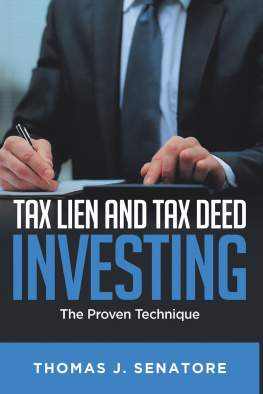Thomas J. Senatore - Tax Lien and Tax Deed Investing: The Proven Technique
Here you can read online Thomas J. Senatore - Tax Lien and Tax Deed Investing: The Proven Technique full text of the book (entire story) in english for free. Download pdf and epub, get meaning, cover and reviews about this ebook. year: 2020, publisher: Christian Faith Publishing, Inc., genre: Romance novel. Description of the work, (preface) as well as reviews are available. Best literature library LitArk.com created for fans of good reading and offers a wide selection of genres:
Romance novel
Science fiction
Adventure
Detective
Science
History
Home and family
Prose
Art
Politics
Computer
Non-fiction
Religion
Business
Children
Humor
Choose a favorite category and find really read worthwhile books. Enjoy immersion in the world of imagination, feel the emotions of the characters or learn something new for yourself, make an fascinating discovery.
- Book:Tax Lien and Tax Deed Investing: The Proven Technique
- Author:
- Publisher:Christian Faith Publishing, Inc.
- Genre:
- Year:2020
- Rating:3 / 5
- Favourites:Add to favourites
- Your mark:
- 60
- 1
- 2
- 3
- 4
- 5
Tax Lien and Tax Deed Investing: The Proven Technique: summary, description and annotation
We offer to read an annotation, description, summary or preface (depends on what the author of the book "Tax Lien and Tax Deed Investing: The Proven Technique" wrote himself). If you haven't found the necessary information about the book — write in the comments, we will try to find it.
Tax Lien and Tax Deed Investing: The Proven Technique — read online for free the complete book (whole text) full work
Below is the text of the book, divided by pages. System saving the place of the last page read, allows you to conveniently read the book "Tax Lien and Tax Deed Investing: The Proven Technique" online for free, without having to search again every time where you left off. Put a bookmark, and you can go to the page where you finished reading at any time.
Font size:
Interval:
Bookmark:

Chapter 1
Tax Lien Basics
T he collection of taxes goes back as far as one can remember and was used to pay for the services provided by the governing body. Today, we use these taxes as a way for the community to pay for the services such as the police department, fire department, schools, sanitation department, and department of public works, city government, government buildings, and more. If the tax collectors did not collect all the taxes that were due from the homeowners, then the tax collectors would not have enough money in their accounts to pay for the services mentioned above that they provide for the community.
There are stories that I heard where people as far back as to the early 1900s were able to buy property for the taxes owed because the owner could not pay for them. Since the beginning of the collection of taxes, the tax collector would always have some people that did not pay their property taxes for one reason or another, and, therefore, the tax collector had to find a way of encouraging the property owner to make the payments. They also had to find a way to get the homeowners pay the delinquent taxes in a fair manner as the tax collector was an elected official and could not be reelected if they did not keep the homeowners investment protected. Another obstacle the tax collector had to overcome was to devise a way in which to encourage others to pay the taxes on behalf of the owners where these others would benefit greatly while protecting the interest of the homeowners who elected these tax collectors. This became a problem for many states, and they had to find a way to enforce the collection of property taxes at the state level.
State laws, more commonly known as statutes, were passed by each state that gave the city or county tax collector the ability to sell off the delinquent taxes as a lien, or they could sell the property with a deed. The problem in this is that since each state passed its own laws or statutes on how the delinquent tax would be sold off, there became fifty-one different varieties of tax sales. You may ask how can there be fifty-one different varieties of tax sales if there are only fifty states. Well, Washington, DC, has its own set of rules as well. Not only does DC have their own way of selling off the delinquent taxes, they even offer a free class to all of those who wish to attend and buy at their sale. We will cover the tax lien sales first, and then we will explain tax deed sales.
The first and most common method of collecting property taxes are by way of tax lien sales. This is where the city or county tax collector would sell by open public auction to a third party (you, the investor) the delinquent taxes at a tax lien sale, and the document you would get is called a tax sale certificate or a tax lien certificate depending on which state youre in. This sale is done after the tax collector had tried over a specific period of time to get the homeowner to pay the delinquent taxes owed. This incentive for the person buying the tax sale certificate (or actually loaning money to the taxing authority on behalf of the property owner) is that are entitled to earn interest on the amount they paid for the tax sale certificate. Think of this like a savings bond that you buy and have to wait several years before you can cash it in. You dont get any money on a monthly basis, but your investment grows on a monthly basis, which is what a tax lien does. This interest can range from 8% to 50% per year depending on which state youre investing in. The method in which the tax collector sells the tax sale certificate also will vary and will be discussed in detail later on in this book.
Now that the tax collector had the means to enforce the collection of taxes, this would cause the tax collector to follow many rules, and for this reason, many cities and counties did not sell these tax liens right away. In some states, there are tax liens held by the tax collector that were over forty years old as I found in a small town in New Jersey called Westwood. This type of investing in tax liens and tax deeds was passed many years ago but only became popular in the past ten to fifteen years. Most of the tax lien sales had a small attendance of one to three people, and in some instances, the tax collector would be the one buying the liens (this is where the city or county held liens began). The tax sales from the 1980s to the late 1990s have been attended by only a few investors. That number has increased over the years, and now, you can have anywhere from ten to one thousand bidders at these sales.
With the tax lien sale, if the property is not sold off to the public, it is then sold to the city or county for the face amount with the maximum amount of interest permitted by law. The city or county then has the ability to complete its own foreclosure against the owners and lien holders in what is called an in rem foreclosure. The tax lien certificates usually have to be held for two years such as in New Jersey, but when the tax collector takes the tax lien certificate, they will start the in rem foreclosure after the certificate is only six months old. The in rem foreclosure usually takes six to eight months, and then the city or county can sell off the property for a profit. Most states have the tax lien sale once a year, and the interest on the certificates range from 10% per year to 20% per year. Most tax liens have to be held by the purchaser for two years on average, and after the two years, they have the right to start a foreclosure action to get the title to the property they have paid the taxes on.
Once you have purchase a tax lien, you must now follow the state statutes on how long the certificate must be held before the foreclosure process can be started. This is what we call the redemption period, and this is for an average of two years. The redemption period is set up to allow the homeowner the opportunity to save their property from being taken away from them in foreclosure for nonpayment of property taxes.
Remember that the tax laws were created to protect homeowners, and if they did not give the homeowner the ability to save their home, the people who created these laws would find themselves out of a job. The time period that a tax sale certificate must be held before the holder can apply for a tax lien foreclosure will vary from one year to three years. In the majority of states, it is two years or twenty-four months before the foreclosure process can be started, and then it takes about another nine months to complete the foreclosure process. All during this time, the property owner has had the chance to redeem the tax lien and keep his home. After the foreclosure is completed, you now own the property and can either keep it, rent it, or sell it, whatever you want because now you are the legal titled owner.
Tax Lien Foreclosure Process
The foreclosure process for tax liens is complex and should be completed by an attorney who understands the procedures of a tax lien foreclosure. If you attempt this by yourself, which you are permitted to do under the laws of our country, you must be sure that you do not make a mistake or miss out on a time limitation or you can lose your entire investment. I cannot emphasize enough on how important it is to have the foreclosure process performed by an attorney. I, myself, being a paralegal who worked on tax lien foreclosure from start to finish, do not do my own tax lien foreclosures. It was something I learned while going through my training as a paralegal that it is not wise to represent yourself in court, and I agree that when it comes to tax lien foreclosure and my money is at stake, I will not take the chance of doing something wrong. I will cover briefly the basic procedure for a tax lien foreclosure from the date that the tax lien is sold at a public auction till you get the deed to the property.
Font size:
Interval:
Bookmark:
Similar books «Tax Lien and Tax Deed Investing: The Proven Technique»
Look at similar books to Tax Lien and Tax Deed Investing: The Proven Technique. We have selected literature similar in name and meaning in the hope of providing readers with more options to find new, interesting, not yet read works.
Discussion, reviews of the book Tax Lien and Tax Deed Investing: The Proven Technique and just readers' own opinions. Leave your comments, write what you think about the work, its meaning or the main characters. Specify what exactly you liked and what you didn't like, and why you think so.











